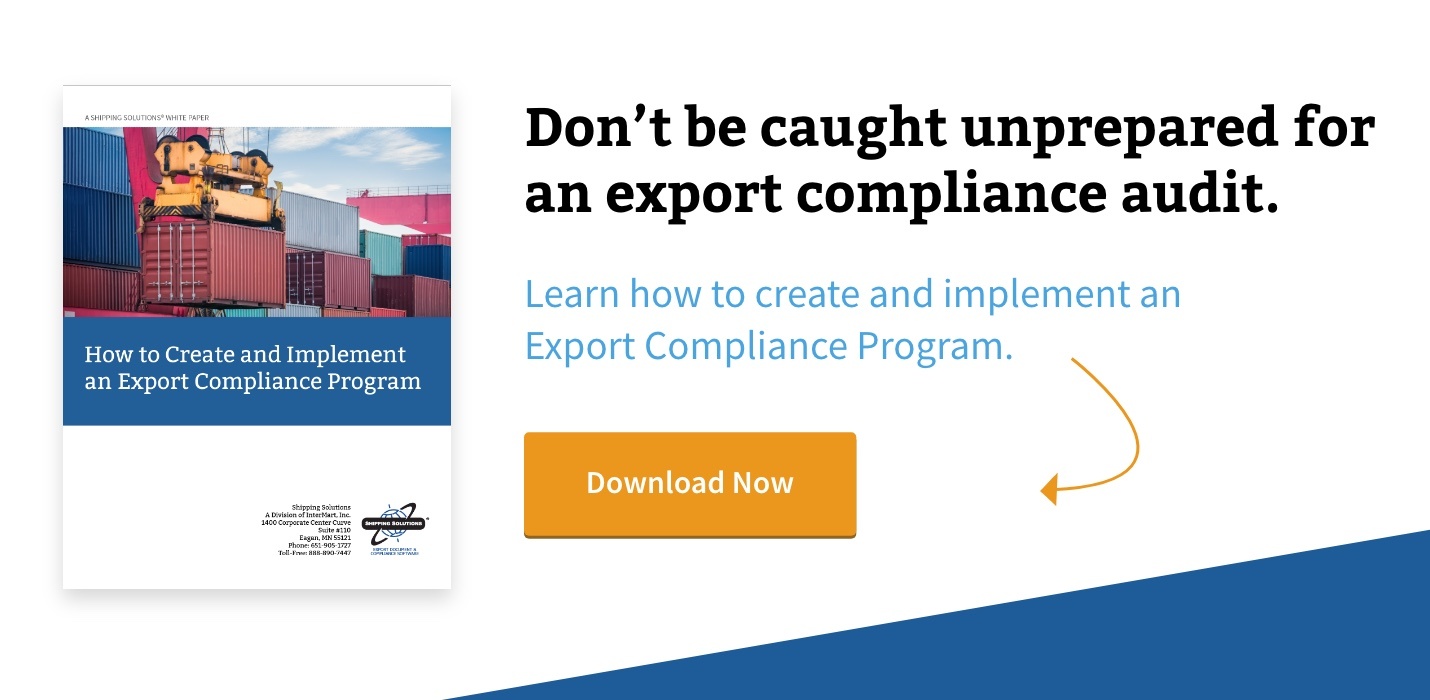The International Trade Blog Export Compliance
The Business Arguments for Investing in Import and Export Compliance
On: November 28, 2016 | By:  John Goodrich |
9 min. read
John Goodrich |
9 min. read

As part of my business, I have the honor of leading a fair number of import and export regulatory compliance seminars. Some of my students have been rather vocal about the compliance issues they’ve experienced within their companies. As a seminar leader my job is to illuminate an issue and introduce tactical solutions the student’s company might consider implementing.
The common response to my suggestions is, “Yeah but.” (This rhymes with rabbit when spoken quickly.) “Yeah, but you don’t understand the situation at my company.” The discussion then continues with some reason why the company has not moved forward with an effective import/export compliance program.
I’ve noticed a pattern in the reasons my students give. To be sure, many of them describe some challenging barriers to implementing effective compliance measures. With all due respect to my students and their companies, the reasons given for not making the necessary investments in regulatory compliance programs boil down to nothing more than excuses.
The individual excuses are too numerous to mention for this article, but I have condensed them into a variety of categories. What excuses are you using to avoid investing in import/export compliance at your company?
Download the free white paper:
How to Create and Implement an
Export Compliance and Management Program (EMCP)
Non-Compliance Excuses
1. The below the radar excuse:
- “We haven’t been caught yet.”
- “What are our chances of being caught?”
- “We’re so small the government won’t bother with us.”
Speeding is speeding no matter how big your car or how fast you were going. Certainly the size of the traffic ticket will depend on the egregiousness of the offense and your prior record. But if you are speeding, it is only a matter of time before you and your company will be pulled over for a talk with the authorities.
2. The lemming excuse:
- “Everybody else is doing it.”
- “But my competitor is getting away with it.”
Forgive me, but this argument is fallacious on so many levels it is hardly worth acknowledging. Perhaps, however, you did not have the benefit of being raised by my mother, so here goes. “If everybody else were jumping off a cliff and killing themselves I suppose you would think that was a good idea, too!” Enough said.
3. The financial excuse:
- “We don’t have the money.”
- “If we focused all of our resources on compliance we would be out of business.”
- “There’s no return on investing in compliance.”
Admittedly companies must make tough financial decisions and allocate resources effectively. Being compliant and staying in business are not mutually exclusive goals. Indeed there is an ROI argument to be made for implementing a regulatory compliance program. We will discuss this in part two of this article.
4. Failure to launch excuse:
- “It’s been on our action plan for the last few years, but we simply haven’t gotten around to it yet.”
- “We have had more pressing business issues that seem to get in the way of proceeding.”
So you are admitting you are lazy and ineffective after all. Shhh. I won’t tell your boss.
5. The ignorance excuse:
- “We don’t know how?”
- “We had no reason to know.”
- “We have always done it that way.”
You wouldn’t jump into the deep end of a swimming pool without first knowing how to swim would you? It is alarming how many otherwise competent managers jump feet first into the depths of importing and exporting without first doing their research.
Two websites:
- Exports—Bureau of Industry and Security.
- Imports—Customs and Border Protection.
Now get online and get swimming, er… reading!
6. Passing the buck excuse:
- “I’m just doing what my boss told me to do.”
- “I’m just doing what my predecessor did.”
- “My broker/forwarder did it.”
- “The dog ate my homework.”
Sorry to say, but the buck stops with you. Fines and penalties accrue to you and your company, not to your service providers or former employees. If you are in the unfortunate situation of working for an uninformed or coercive manager, you have my sympathy. That still does not give you permission to break the law.
7. The political statement:
- “The (expletive deleted) government is driving honest business people out of business with all of these (more expletives) regulations!”
Agreed, regulation imposes a certain burden on companies. For some of you that burden seems insurmountable. Unfortunately, conscientious objector has not been an effective defense when it comes to import and export regulatory compliance. If you're going to play the import/export game you have no choice but to comply with the law.
For those who feel compelled to follow the political path, there are effective means of engaging the regulators. Both U.S. Customs and Commerce offices, for example, maintain programs for actively soliciting advice from the trade in an effort to promulgate effective, less-burdensome regulation.
8. Corporate gridlock excuse:
- “I don’t have the authority to make changes.” (See not my fault.)
- “Implementing change takes so long at my company.”
- “We simply can’t gain consensus at my company so nothing happens.”
This is one of the more real and dicey barriers facing companies. If you analyze your situation, you will discover that gridlock is the result of one of the other issues discussed within this article. As compliance professionals you will have to be creative in breaking down the barriers and moving your company’s compliance programs forward. The second portion of this article might help spur some ideas for you.
If you give up on this issue, you have abdicated one of your primary responsibilities. If you truly believe you can’t make a difference, it might be time to step aside and let others tackle the problem.
9. Denial:
- “But we are a compliant company.”
- “We didn’t mean to break the law. We’re good people.”
- “It isn’t really as bad as it appears.”
As they say, denial is more than just a river in Egypt. Best intentions and ethics statements do not a compliance program make. If you do not have a business process in place for evaluating and measuring your company’s import and export compliance levels, you are at risk.
Interestingly there are many good and well-intentioned companies that run amiss of the regulations. While Customs does not actively advertise the penalties it assesses, the Commerce Department does regularly share its Major Cases List at the BIS website listed above.
Ask yourself, what would happen if your company lost its importing or exporting privileges? Perhaps the answer to that question will motivate you.
10. The whine:
- “It’s hard.”
- “We’ve tried that before!”
- “It won’t work.”
Download the free white paper:
What You Need to Know about Export Compliance
Why Your Company Needs Compliance Guidelines
1. Regulatory Imperative
Play fair and play by the rules. It's the right thing to do. Compliance with import/export regulations is the law. Honesty and integrity are their own rewards.
This should be argument enough for any company to strive to continually enhance its import/export compliance program.
While I would like to believe this feel-good-flag-waving-mom-and-apple-pie argument would be enough to motivate all of your companies I am not that naïve. Some of your companies may require additional convincing.
2. Risk and Penalty Avoidance
I think of this as the “or-else” argument. Others might call this the “fear” argument. Non-compliance with the import/export regulations carries with it serious penalties, chief among these is the loss of importing and or exporting privileges.
If you choose not to play by the rules, the federal government can take measures to bar you from playing the import/export game. Such restrictions could prevent your company from being successful in today’s global economy.
Both import and export regulations carry with them impressively large fines for non-compliance.
By way of example, the Commerce Department regularly releases a publication called Don't Let This Happen to You! This publication, which discloses the fines and penalties assessed against companies for export non-compliance, is an effective tool to gain support within your company’s organization.
While Customs does not regularly or publicly publish the penalties it has assessed against importers, they did recently make it known that a well-known manufacturer was assessed fines in excess of $40 million for alleged improper use of NAFTA and record-keeping infractions.
As a rule, the fines and penalties provide a compelling business argument, albeit a negative one, for companies to develop import/export compliance programs.
If that doesn't strike you with fear, remember that in extraordinary cases of non-compliance, both import and export regulations allow for imprisonment of the individual.
3. Competitive Advantage
Import/export regulatory compliance is good business. Companies that invest in trade compliance programs see positive returns on investment.
As an importer or exporter your company has already made a strategic decision that international sourcing and selling are key to its success. To achieve the full benefit of importing and exporting, your company must strive to master a variety of competencies including sourcing, marketing, international contracting, logistics and regulatory compliance. In other words, mastery of import/export compliance is a business necessity, not a luxury. Investment in import/export regulatory compliance pays dividends in both quantifiable and intangible ways.
- Reduced and known costs lead to competitive pricing: A commitment to core compliance competencies, such as classification, pays dividends in predictable and accurate payment of duties and fees. A company that knows its costs can price its products more accurately and competitively.
- Participation in preferential trade programs leads to a competitive advantage: A commitment to a rigorous compliance program permits a company to participate in more complex duty minimization programs such as free trade agreements, 9801/9802, duty preference programs and duty drawback. This argument applies to importers and exporters alike. Importers can clearly quantify the reduction in duties they pay to the government. The benefit to exporters may be in increased sales. An exporter who supports compliance, for example, will be able to participate in NAFTA and will find their products to be more competitive in Mexico and Canada.
(Those of you participating in preferential duty and trade programs without robust compliance programs are participating in behavior that puts your company at risk. See reason two above.) - Supply chain cost reductions: Disciplined compliance programs contribute to predictable, dependable international supply chains. Dependability and regularity in a supply chain allows a company to focus on cycle time reductions. Those of you familiar with supply chain management know that reduced cycle times relate directly to reductions in inventory costs.
I am familiar with one importer whose commitment to a more disciplined management of the import clearance process resulted in a four-week reduction in its overall cycle times. This resulted in an annualized inventory carrying cost savings of greater than $500,000. While much of the four-week cycle time reduction was a result of transit time gains, it was the focus on compliance that allowed the company to identify the opportunity and realize the gain. - Logistics savings: As in the above argument, companies that focus on auditing their imports and exports for compliance purposes uncover logistics cost savings opportunities. A logistics rule of thumb states that an unmanaged transportation program includes an approximate 10 percent cost savings opportunity. The savings are generally discovered in a combination of misrated freight bills and misrouted cargo.
- Ethical behavior pays dividends: Commitment to regulatory compliance is an indicator of an ethical business environment. Studies indicate that while ethical behavior does not guarantee success, success cannot be achieved or maintained in the long run without it. (Admittedly, recent anecdotal evidence has shown that unethical behavior has resulted in some rather wealthy scoundrels, too.) For mainstream business, however, this argument holds true. In an increasingly commodity-driven global environment, a reputation for doing business ethically and honorably can be the differentiating factor in establishing and maintaining business relationships. This argument is the most difficult to quantify.
This last argument seems to bring us full circle to our first argument: your company should comply with the regulations because they are the law.
A final thought. Throughout your company you have made a commitment to a wide range of professional competencies and services including accounting, human resources, product development and supply chain. You have made these commitments for the very same reasons I have detailed above for import/export compliance.
What is holding your company back from making a comparable investment in import/export regulatory compliance?
This article was first published in September 2006 as a two-part series. It has been combined into a single article and updated to include current information, links and formatting.

About the Author: John Goodrich
John Goodrich is an International Trade Consultant and Licensed Customhouse Broker with more than 25 years of experience in international trade. He is currently the principal in the consulting firm of JD Goodrich & Associates where his varied industry experience results in practical, actionable advice for his clients.
An active member in the Twin Cities round table of the Council of Supply Chain Management Professionals (CSCMP), he takes a strategic view of the roles of international compliance and logistics in the greater supply chain.


